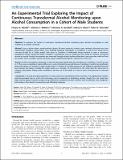An experimental trial exploring the impact of continuous transdermal alcohol monitoring upon alcohol consumption in a cohort of male students
Abstract
Objective: To examine the impact of continuous transdermal alcohol monitoring upon alcohol consumption in male students at a Scottish university. Method: Using a within-subject mixed-methods design, 60 male university students were randomly allocated into three experimental conditions using AUDIT score stratified sampling. Participants in Conditions A and B were asked not to consume alcohol for a 14-day period, with those in Condition A additionally being required to wear a continuous transdermal alcohol monitoring anklet. Condition C participants wore an anklet and were asked to continue consuming alcohol as normal. Alcohol consumption was measured through alcohol timeline follow-back, and using data collected from the anklets where available. Diaries and focus groups explored participants’ experiences of the trial. Results: Alcohol consumption during the 14-day trial decreased significantly for participants in Conditions A and B, but not in C. There was no significant relative difference in units of alcohol consumed between Conditions A and B, but significantly fewer participants in Condition A drank alcohol than in Condition B. Possible reasons for this difference identified from the focus groups and diaries included the anklet acting as a reminder of commitment to the study (and the agreement to sobriety), participants feeling under surveillance, and the use of the anklet as a tool to resist social pressure to consume alcohol. Conclusions: The study provided experience in using continuous transdermal alcohol monitors in an experimental context, and demonstrated ways in which the technology may be supportive in facilitating sobriety. Results from the study have been used to design a research project using continuous transdermal alcohol monitors with ex-offenders who recognise a link between their alcohol consumption and offending behaviour.
Citation
Neville , F G , Williams , D J , Goodall , C , Murer , J S & Donnelly , P D 2013 , ' An experimental trial exploring the impact of continuous transdermal alcohol monitoring upon alcohol consumption in a cohort of male students ' , PLoS ONE , vol. 8 , no. 6 , e67386 . https://doi.org/10.1371/journal.pone.0067386
Publication
PLoS ONE
Status
Peer reviewed
ISSN
1932-6203Type
Journal article
Collections
Items in the St Andrews Research Repository are protected by copyright, with all rights reserved, unless otherwise indicated.

